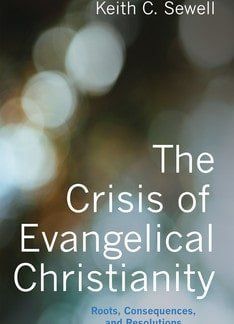Keith Sewell (Professor of history at Dordt College, Iowa) brings his extensive knowledge of the history of Christianity to an assessment of evangelicalism today.
He points out the early and ubiquitous influence of Platonism on the post-apostolic church. He remarks how ‘notions of holiness consisting in a constant abstemiousness with respect to ordinary, creaturely existence ran counter to the main thrust of biblical teaching, with its strong, creation affirming orientation’ (p.21). This perspective was, he believes, only partially refuted in the Reformation.
He analyses several strands in the Reformation. He believes that Calvin’s eschewal of a ‘false literalism’ was faithful to a true understanding of Scripture. He also believes that Calvin’s concern for the wider implications of biblical principles and the state of the culture in which he was living were steps in the right direction. However, Sewell avers that the Reformation was only a start and that evangelicals should be ‘always reforming’.
While not denying John Wesley’s Herculean evangelistic efforts, he believes that his version of a subjective, pietistic Christianity was rooted in Platonism. From it (and other influences) came second-experience theology, individualism and, ultimately, the Charismatic movement.
He argues for a cessationist position regarding miraculous spiritual gifts, while pointing out that ‘the term is regrettable … [it] should not be misrepresented as disbelief in the Holy Spirit … nor does it amount to a disavowal of the miraculous’ (p.97). He critiques ‘third wave’ Charismatic influence and the use of worship groups to lead the congregation. He suggests, ‘Few evangelicals know enough of the history of Christianity to adequately understand their present predicament’ (p.172).
He believes there has been an intellectual deficit within evangelicalism that caused it to be caught out by the rise of Higher Criticism. More controversially for many evangelicals, while he supports an understanding of the infallibility of Scripture, he does not accept the old Princeton position of inerrancy: he believes that many have been over-zealous in looking for literal interpretations of Genesis 1-11, and suggests that, if intelligent design (ID) ‘is to prove the existence of God, then ID fails because the God revealed in the Bible is the Creator of all things, including the laws of logic, to which he is not subject’ (p.165).
He criticises what he calls the ‘double reductionism of evangelicalism’. As he sees it, we have reduced everything to church and missions, and then made a further reduction by preaching a gospel that is largely confined to an individual and personal salvation.
In contrast, he believes there should be an emphasis on seeing the full-orbed nature of God’s creation and a Christian’s part in it. He comments, ‘Some might decry this as the sacralisation of the secular, or the secularisation of the sacred, but that is to introduce false dichotomies, extrinsic to the Bible’ (pp.204-5).
Sewell’s grasp of his subject is impressive. However, the wealth of material he presents to support his thesis might overwhelm some, including busy pastors. This is a pity, because I think there is much to be gained from his insights.
Colin Hamer
Warrington



